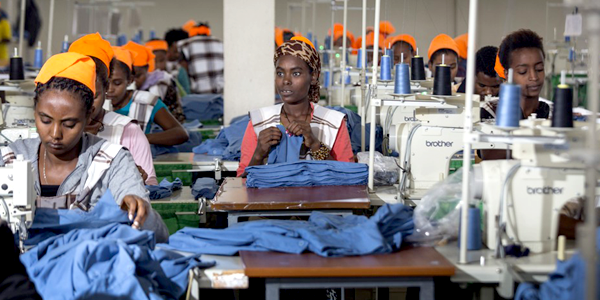
Recent news report that the Kaduna Textile Mills, the New Nigeria Development Company (NNDC), in partnership with a Turkish firm and in collaboration with the federal government will invest $15 million to reactivate the collapsed Kaduna Textile Company is a welcomed development. The move is in line with President Muhammadu Buhari administration’s policy of resuscitating the textile industry, among others, to provide more job opportunities in the country.
The textile company was started in 1956 in Kaduna to process the cotton being produced in the northern part of the country. Many other textile companies soon sprang up in Lagos and between Kaduna and Kano axis. By the 1970s and the early 1980s, the Nigerian textile industry had grown to become the third largest in Africa and employed well over 400,000 Nigerians across the country.
The oil boom of the 1970s and the early 1980s which increased the purchasing power of the government and the citizens led to the neglect of agriculture and many vital industries, particularly the textile industry, thus crippling other sectors of the economy and putting the economic viability of the country in serious jeopardy. Thereafter, the textile industry suffered neglect and by 2002 the Kaduna Textile Mill closed with more than 7,000 of its workers sent home. Today, the textile industry employs less than 30,000 workers with the factories operating either below capacity or totally closed and most of their plants in operational distress.
The first attempt to revive the industry was in 2010 when the Bank of Industry (BoI) approved N10 billion textile revival fund. The fund increased capacity utilisation in the industry from 29.14 per cent to the current 50 per cent. In reviving the industry this time around the government must also focus on the production of cotton, kenaf and other raw materials that are associated with the textile industry.
It is a good thing that in revitalising the textile industry, government has put in place the cotton, textile and garment policy. Towards this end, it has directed that uniforms of military and para-military personnel as well as uniforms for many public schools students should, henceforth, be produced and purchased locally. With this policy in place and, if the prices are right, governments in the ECOWAS sub-regional market will patronise Nigerian textile industry.
In addition, government’s current intervention in the industry must be effective and sustained so that the local textile industry can thrive and flourish again. In the past, poor power supply and high interest rates on borrowed funds escalated the cost of production of local textile mills. This time around, the government must ensure improved power supply across the country so as to lower the cost of production for the textile mills, while the government should create intervention funds through the Central Bank of Nigeria (CBN) as alternative to loans from commercial banks which attract high interest rates.
Furthermore, the Department of Customs must also address the smuggling of cheap textile goods and second hand clothing by Nigerians and Asians, particularly Indians and Chinese into the country. There must also be frequent access to long-term finance by the BoI and other investment banks in the country to enable the textile mills stock raw materials and change their machinery as and when due. There is no doubt that if this new tempo is maintained and sustained, the Cotton, Textile and Garment industry will thrive and blossom again.
We believe that with such strategic revamping and repositioning, the Cotton, Textile and Garment industry promises to be one of the effective ways of providing employment for the teeming youth, thus promoting economic growth and stability of the country.